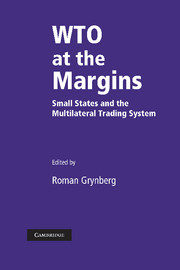Book contents
- Frontmatter
- Contents
- List of figures and appendices
- List of tables
- List of contributors
- Introduction
- Part I Theory and evidence
- Part II WTO and small economies
- Part III WTO dispute settlement
- 11 Small states in the banana dispute
- 12 Impact of changes in the European Union's policy for banana imports on the Eastern Caribbean Region (1992–2002)
- 13 Jamaica and the case in the WTO against the European Communities regime for the importation, sale and distribution of bananas (1992–2001)
- 14 WTO complaints by Australia and Brazil regarding the EU sugar regime
- 15 Reform of EU export subsidies on sugar: the legal and economic implications for the ACP countries
- 16 Analysis of the impact of opening up the EU import market for canned tuna on ACP countries
- Part IV Negotiating issues and institutional arrangements
- Index
15 - Reform of EU export subsidies on sugar: the legal and economic implications for the ACP countries
Published online by Cambridge University Press: 05 May 2010
- Frontmatter
- Contents
- List of figures and appendices
- List of tables
- List of contributors
- Introduction
- Part I Theory and evidence
- Part II WTO and small economies
- Part III WTO dispute settlement
- 11 Small states in the banana dispute
- 12 Impact of changes in the European Union's policy for banana imports on the Eastern Caribbean Region (1992–2002)
- 13 Jamaica and the case in the WTO against the European Communities regime for the importation, sale and distribution of bananas (1992–2001)
- 14 WTO complaints by Australia and Brazil regarding the EU sugar regime
- 15 Reform of EU export subsidies on sugar: the legal and economic implications for the ACP countries
- 16 Analysis of the impact of opening up the EU import market for canned tuna on ACP countries
- Part IV Negotiating issues and institutional arrangements
- Index
Summary
Introduction
ACP countries have preferential terms of access for their sugar exports to the EU. The Sugar Protocol of the Lomé Agreement gives (indefinite) dutyfree access for agreed quantities of sugar at guaranteed (protected domestic EU) prices to specific ACP Protocol countries. This results in these ACP countries receiving prices for their sugar exports to the EU that are in excess of those on the world market, and a corresponding transfer of income that embodies a significant element of rent or ‘aid’.
In September 2002, Australia and Brazil filed complaints and requests for consultations with the EU at the WTO, concerning the nature of the EU's sugar market. The complaint is that the volume of EU subsidised exports of sugar exceeds the levels the EU had committed itself to under the Uruguay Round Agreements. If this challenge at the WTO leads to reforms of the EU sugar policies, then this may lead to reductions in protected EU import prices and therefore in turn to reductions in the level of income transfer to the ACP Protocol exporters. Reduced rents or ‘aid’ to these relatively sugar-dependent ACP exporters may have serious macroeconomic implications, in terms of incomes, employment, the balance of payments and tax revenue.
The EU sugar regime
The production of beet sugar in the EU is limited under the Common Agricultural Policy (CAP) by the imposition of country-specific quotas that form part of an overall EU quota limit. Quotas apply to the finished refined product (white sugar) but implicitly constrain production of the raw beet.
- Type
- Chapter
- Information
- WTO at the MarginsSmall States and the Multilateral Trading System, pp. 535 - 561Publisher: Cambridge University PressPrint publication year: 2006
- 1
- Cited by



